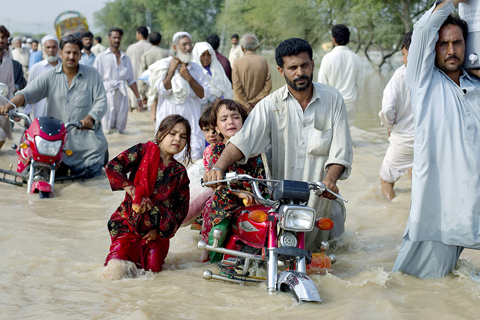The death toll from massive floods in northwestern Pakistan rose to 1,100 yesterday as rescue workers struggled to save more than 27,000 people still trapped by the raging water.
The rescue effort was aided by a slackening of the monsoon rains that have caused the worst flooding in decades in Khyber-Pakhtoonkhwa Province. Only as flood waters started to recede have authorities begun to understand the full scale of the disaster.
“Aerial monitoring is being conducted and it has shown that whole villages have washed away, animals have drowned and grain storages have washed away,” said Latifur Rehman, spokesman for the Provincial Disaster Management Authority. “The destruction is massive.”

PHOTO: REUTERS
The flooding, which the UN estimates has affected 1 million people nationwide, comes at a time when the Pakistani government is already grappling with a faltering economy and a war against the Taliban.
The US, which spends billions of dollars to dampen anti-US sentiment in Pakistan, has stepped in to offer emergency aid to the northwest.
The 1,100 death toll from the flooding could go even higher since rescue workers have been unable to access certain areas, said Adnan Khan, a disaster management official.
Almost 700 people have drowned in the Peshawar valley, which includes the districts of Nowshera and Charsada, and 115 others are still missing, Khan said.
The districts of Swat and Shangla have also been hit hard and have suffered more than 400 deaths, said Mujahid Khan, the head of rescue services for the Edhi Foundation, a private charity.
Residents of Swat were still trying to recover from a major battle between the army and the Taliban last spring that caused widespread destruction and drove some 2 million people from their homes. About 1 million of those are still displaced.
In Swat alone, the floods have destroyed more than 14,600 houses and 22 schools, Khan said.
Authorities have deployed 43 military helicopters and more than 100 boats to try to rescue about 27,300 people still trapped by the floods, Rehman said.
“All efforts are being used to rescue people stuck in inaccessible areas and all possible help is being provided to affected people,” he said.
However, some residents stepped up their criticism of the government’s response.
“The flood has devastated us all and I don’t know where my family has gone,” said Hakimullah Khan, a resident of Charsadda who complained the government has not helped him search for his missing wife and three children. “Water is all around and there is no help in sight.”
The threat of disease loomed as well, as some evacuees in the northwest arrived in camps with fever, diarrhea and skin problems.
“There is now a real danger of the spread of waterborne diseases, like diarrhea, asthma, skin allergies and perhaps cholera in these areas,” said Shaharyar Bangash, the head of operations in Khyber-Pakhtoonkhwa for World Vision, an international humanitarian group.

In his National Day Rally speech on Sunday, Singaporean Prime Minister Lawrence Wong (黃循財) quoted the Taiwanese song One Small Umbrella (一支小雨傘) to describe his nation’s situation. Wong’s use of such a song shows Singapore’s familiarity with Taiwan’s culture and is a perfect reflection of exchanges between the two nations, Representative to Singapore Tung Chen-yuan (童振源) said yesterday in a post on Facebook. Wong quoted the song, saying: “As the rain gets heavier, I will take care of you, and you,” in Mandarin, using it as a metaphor for Singaporeans coming together to face challenges. Other Singaporean politicians have also used Taiwanese songs

NORTHERN STRIKE: Taiwanese military personnel have been training ‘in strategic and tactical battle operations’ in Michigan, a former US diplomat said More than 500 Taiwanese troops participated in this year’s Northern Strike military exercise held at Lake Michigan by the US, a Pentagon-run news outlet reported yesterday. The Michigan National Guard-sponsored drill involved 7,500 military personnel from 36 nations and territories around the world, the Stars and Stripes said. This year’s edition of Northern Strike, which concluded on Sunday, simulated a war in the Indo-Pacific region in a departure from its traditional European focus, it said. The change indicated a greater shift in the US armed forces’ attention to a potential conflict in Asia, it added. Citing a briefing by a Michigan National Guard senior

CHIPMAKING INVESTMENT: J.W. Kuo told legislators that Department of Investment Review approval would be needed were Washington to seek a TSMC board seat Minister of Economic Affairs J.W. Kuo (郭智輝) yesterday said he received information about a possible US government investment in Taiwan Semiconductor Manufacturing Co (TSMC, 台積電) and an assessment of the possible effect on the firm requires further discussion. If the US were to invest in TSMC, the plan would need to be reviewed by the Department of Investment Review, Kuo told reporters ahead of a hearing of the legislature’s Economics Committee. Kuo’s remarks came after US Secretary of Commerce Howard Lutnick on Tuesday said that the US government is looking into the federal government taking equity stakes in computer chip manufacturers that

US President Donald Trump on Friday said that Chinese President Xi Jinping (習近平) told him China would not invade Taiwan while Trump is in office. Trump made the remarks in an interview with Fox News, ahead of talks with Russian President Vladimir Putin over Moscow’s invasion of Ukraine. “I will tell you, you know, you have a very similar thing with President Xi of China and Taiwan, but I don’t believe there’s any way it’s going to happen as long as I’m here. We’ll see,” Trump said during an interview on Fox News’ Special Report. “He told me: ‘I will never do